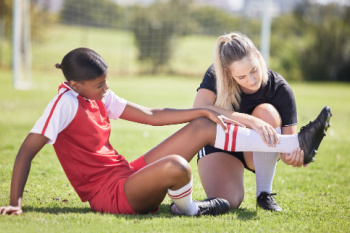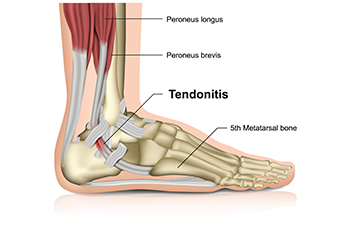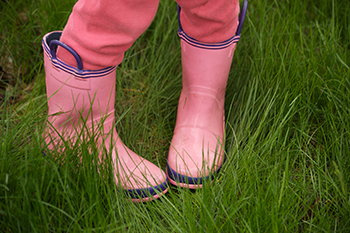
Foot injuries are a frequent problem in many sports, but some athletes face a higher risk than others. Studies show that athletes in gymnastics, cross-country, track and field, and soccer tend to experience foot injuries more often. Both men and women in these sports are affected, but female track and field athletes appear to have a higher rate of injury compared to their male counterparts. The most common foot injuries include bruising of the foot or toes, injuries to the midfoot, plantar fascia strain, turf toe, and fractures of the metatarsal bones. Among these, metatarsal fractures, plantar fascia injuries, midfoot damage, and contusions are considered the most severe and frequent. If you are an athlete involved in high-impact sports, and experience persistent foot pain, it is suggested that you see a podiatrist who can advise with prevention strategies and guide you toward treatment to keep you active and injury-free.
Sports related foot and ankle injuries require proper treatment before players can go back to their regular routines. For more information, contact Dr. Stephen Petrofsky of Florida. Our doctor can provide the care you need to keep you pain-free and on your feet.
Sports Related Foot and Ankle Injuries
Foot and ankle injuries are a common occurrence when it comes to athletes of any sport. While many athletes dismiss the initial aches and pains, the truth is that ignoring potential foot and ankle injuries can lead to serious problems. As athletes continue to place pressure and strain the area further, a mild injury can turn into something as serious as a rupture and may lead to a permanent disability. There are many factors that contribute to sports related foot and ankle injuries, which include failure to warm up properly, not providing support or wearing bad footwear. Common injuries and conditions athletes face, including:
- Plantar Fasciitis
- Plantar Fasciosis
- Achilles Tendinitis
- Achilles Tendon Rupture
- Ankle Sprains
Sports related injuries are commonly treated using the RICE method. This includes rest, applying ice to the injured area, compression and elevating the ankle. More serious sprains and injuries may require surgery, which could include arthroscopic and reconstructive surgery. Rehabilitation and therapy may also be required in order to get any recovering athlete to become fully functional again. Any unusual aches and pains an athlete sustains must be evaluated by a licensed, reputable medical professional.
If you have any questions please feel free to contact our office located in Port Charlotte, FL . We offer the newest diagnostic and treatment technologies for all your foot and ankle needs.

Achilles tendonitis is a painful condition that affects the tendon connecting the calf muscles to the heel bone. It often develops due to overuse, repetitive strain, or sudden increases in physical activity. Common symptoms include pain and stiffness in the back of the heel, swelling, and tenderness that worsens with movement. The condition may result from wearing improper footwear, poor biomechanics, or tight calf muscles that place excessive stress on the tendon. Preventing Achilles tendonitis involves stretching the calf muscles regularly, wearing supportive footwear, and gradually increasing exercise intensity. Strengthening the lower leg muscles can also help reduce strain on the tendon. Rest and proper treatment are essential to avoid worsening the condition. If you have sustained an Achilles tendon injury, it is suggested that you consult a podiatrist who can accurately diagnose and treat this condition.
Achilles tendon injuries need immediate attention to avoid future complications. If you have any concerns, contact Dr. Stephen Petrofsky of Florida. Our doctor can provide the care you need to keep you pain-free and on your feet.
What Is the Achilles Tendon?
The Achilles tendon is a tendon that connects the lower leg muscles and calf to the heel of the foot. It is the strongest tendon in the human body and is essential for making movement possible. Because this tendon is such an integral part of the body, any injuries to it can create immense difficulties and should immediately be presented to a doctor.
What Are the Symptoms of an Achilles Tendon Injury?
There are various types of injuries that can affect the Achilles tendon. The two most common injuries are Achilles tendinitis and ruptures of the tendon.
Achilles Tendinitis Symptoms
- Inflammation
- Dull to severe pain
- Increased blood flow to the tendon
- Thickening of the tendon
Rupture Symptoms
- Extreme pain and swelling in the foot
- Total immobility
Treatment and Prevention
Achilles tendon injuries are diagnosed by a thorough physical evaluation, which can include an MRI. Treatment involves rest, physical therapy, and in some cases, surgery. However, various preventative measures can be taken to avoid these injuries, such as:
- Thorough stretching of the tendon before and after exercise
- Strengthening exercises like calf raises, squats, leg curls, leg extensions, leg raises, lunges, and leg presses
If you have any questions please feel free to contact our office located in Port Charlotte, FL . We offer the newest diagnostic tools and technology to treat your foot and ankle needs.

Many children walk with their feet turned inward or outward, also known as in-toeing or out-toeing. In-toeing occurs when the feet point inward while walking. It is often caused by inward twisting of the shinbone or thighbone, or a curved foot shape present at birth. Out-toeing, where the feet point outward, may result from an outward twist in the leg bones or hip position. These conditions are usually painless and improve as a child grows. They can be influenced by genetics, fetal positioning, or natural variations in bone development.. Encouraging proper footwear and monitoring walking patterns can help ensure gradual healthy foot development. If your child has feet that turn inward or outward, it is suggested that a podiatrist is consulted who can rule out potential conditions, and can monitor your child’s foot health.
The health of a child’s feet is vital to their overall well-being. If you have any questions regarding foot health, contact Dr. Stephen Petrofsky of Florida. Our doctor can provide the care you need to keep you pain-free and on your feet.
Tips for Keeping Children's Feet Healthy
- Make sure their shoes fit properly
- Look for any signs of in-toeing or out-toeing
- Check to see if they have Clubfoot (condition that affects your child’s foot and ankle, twisting the heel and toes inward) which is one of the most common nonmajor birth defects.
- Lightly cover your baby’s feet (Tight covers may keep your baby from moving their feet freely, and could prevent normal development)
- Allow your toddler to go shoeless (Shoes can be restricting for a young child’s foot)
- Cut toenails straight across to avoid ingrown toenails
- Keep your child’s foot clean and dry
- Cover cuts and scrapes. Wash any scratches with soap and water and cover them with a bandage until they’ve healed.
If you have any questions, please feel free to contact our office located in Port Charlotte, FL . We offer the newest diagnostic and treatment technologies for all your foot care needs.









